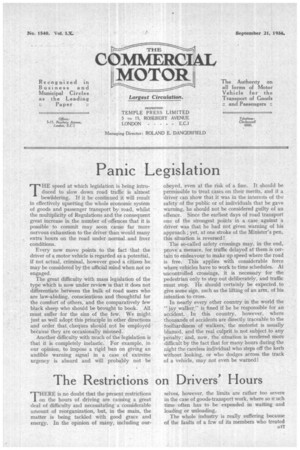Panic Legislation
Page 75

If you've noticed an error in this article please click here to report it so we can fix it.
THE speed at which legislation is being introduced to slow down road traffic is almost bewildering. If it be continued it will result in effectively upsetting the whole economic system of goods and passenger transport by road, whilst the multiplicity of Regulations and the consequent great increase in the number of offences that it is possible• to commit may soon cause far more nervous exhaustion to the driver than would many extra hours on the road under normal and freer conditions.
Every new move points to the fact that the driver of a motor vehicle is regarded as a potential, if not actual, criminal, however good a citizen he may be considered by the official mind when not so engaged.
The great difficulty with mass legislation of the type which is now under review is that it does not differentiate between the bulk of road users who are law-abiding, conscientious and thoughtful for the comfort of others, and the comparatively few black sheep who should be brought to book. All must suffer for the sins of the few. We might. just as well adopt this principle in other directions and order that, cheques should_ not be employed because they are occasionally misused.
Another difficulty with much of the legislation is that it is completely inelastic. For example, in our opinion, to impose a rigid ban on giving an audible warning signal in a case of extreme urgency is absurd and will probably not be obeyed, even at the risk of a fine. It should be permissible to treat cases on their merits, and if a driver can show that it was in the interests of the safety of the public or of individuals that he gave warning, he should not be considered guilty of an offence. Since the earliest days of road transport one of the strongest points' in a .case against a driver was that he had not given warning of his approach.; yet, at one stroke of the Minister's pen, this situation is reversed!
The so-called safety crossings may, in the end, prove a menace, for traffic delayed at them is certain to endeavour to make up speed where the road is free. This applies with considerable force where vehicles have to work to time schedules. At uncontrolled crossings, it is necessary for the pedestrian only to step out deliberately, and traffic must stop. He should certainly be expected_ to give some sign, such as the lifting of an arm, of his intention to cross.
In nearly every other country in the world the " jay walker," is fined if he be responsible for an accident. . In this country, however, where thousands of accidents are directly traceable to the foolhardiness of walkers, the motorist is usually blamed, and the real culprit is not subject to any penalty; and, now, the' situation is rendered more difficult by the fact that for many hours during the night the careless individual who steps off the kerb without looking, or who dodges across the track of a vehicle, may not even be warned!








































































































































































